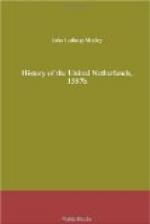The States, in another blunt letter to the Queen herself, declared the loss of Deventer to be more disastrous to them than even the fall of Antwerp had been; for the republic had now been split asunder, and its most ancient and vital portions almost cut away. Nevertheless they were not “dazzled nor despairing,” they said, but more determined than ever to maintain their liberties, and bid defiance to the Spanish tyrant. And again they demanded of, rather than implored; her Majesty to be true to her engagements with them.
The interviews which followed were more tempestuous than ever. “I had intended that my Lord of Leicester should return to you,” she said to the envoys. “But that shall never be. He has been treated with gross ingratitude, he has served the Provinces with ability, he has consumed his own property there, he has risked his life, he has lost his near kinsman, Sir Philip Sidney, whose life I should be glad to purchase with many millions, and, in place of all reward, he receives these venomous letters, of which a copy has been sent to his sovereign to blacken him with her.” She had been advising him to return, she added, but she was now resolved that he should “never set foot in the Provinces again.”
Here the Earl, who, was present, exclaimed—beating himself on the breast—“a tali officio libera nos, Domine!”
But the States, undaunted by these explosions of wrath, replied that it had ever been their custom, when their laws and liberties were invaded, to speak their mind boldly to kings and governors, and to procure redress of their grievances, as became free men.
During that whole spring the Queen was at daggers drawn with all her leading counsellors, mainly in regard to that great question of questions—the relations of England with the Netherlands and Spain. Walsingham—who felt it madness to dream of peace, and who believed it the soundest policy to deal with Parma and his veterans upon the soil of Flanders, with the forces of the republic for allies, rather than to await his arrival in London—was driven almost to frenzy by what he deemed the Queen’s perverseness.




